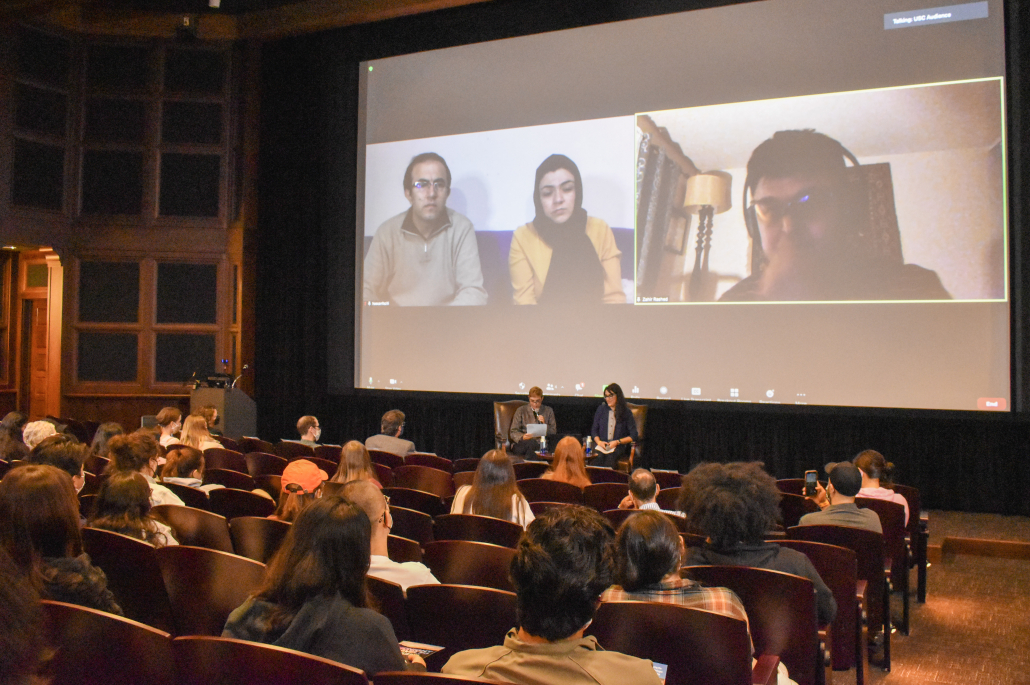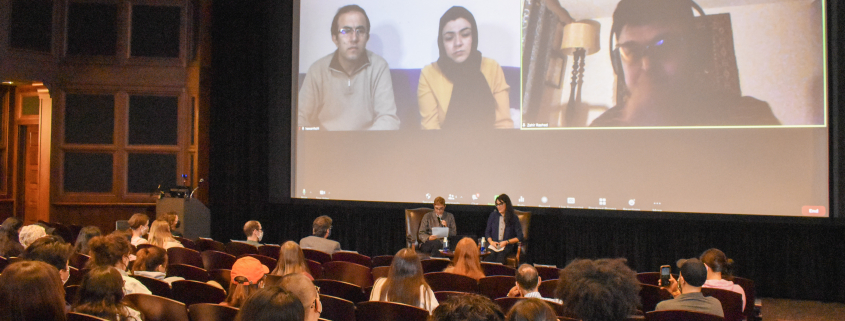Hassan Fazili and Fatima Hussaini discuss ‘Midnight Traveler’

Students excitedly murmured in the crowd Monday night at the Ray Stark Family Theater for a Vision and Voices event.
The event featured “Midnight Traveler” (2019) and filmmakers Hassan Fazili and Fatima Hussaini, a couple who documented their migrant journey from Afghanistan to various Middle Eastern and European destinations with their two young daughters, Nargis and Zahra.
Other moderators and panelists included historian Marjan Wardaki from Yale, Doris Berger from the Academy Museum of Motion Pictures, professor Paul Lerner and librarian Michaela Ullmann from USC.
Fazili and Hussaini, who currently live in Germany, attended the event virtually via Zoom alongside their translator Zahir Rashed.
Lerner opened the night with some contextual information about the international migrant crisis and more specifically, the problems arising from Afghanistan.
“At the end of 2020, over 80 million people have been forcibly displaced worldwide, meaning that one out of every 91 people has had to flee their home” Lerner said. “It’s clear that forced migration is among the greatest challenges facing the world today. But the numbers do not tell the whole story. ‘Midnight Traveler’ provides an intimate glimpse into the human side of just one of these millions of stories.”
Ullmann thanked all the event contributors, including the filmmakers, translator and moderators. Wardaki also discussed the warped view of Afghanistan in the Westernized world.
She then listed off the general themes that taint many Americans’ opinion of Afghanistan. According to Wardaki, this included the reemergence of the Taliban, the weak Afghan governments that were essentially puppets under the United States’ influence and radical Islamic believers. In addition to this context, she also recognized the biases of Westernized education systems.
“I always like to remind my students as scholars, we are often complicit in this image and in perpetuating this image of Afghanistan,” Wardaki said.
The first clip from “Midnight Traveler” showed Fazili and Hussaini’s children on an amusement park swing ride, with a voiceover in Farsi. This voice described the film as the family’s “journey to the edge of hell.” After playing this scene in the theater, Fazili opened up about his inspiration for the film.
“Much bigger filmmakers are running after film ideas, but we didn’t do that. At this drought, we found that this documentary idea found us,” Fazili said.
When asked about the role their children played in the film, Fazili encouraged his wife to answer, as she had looked after the children while he focused more on the process of documentation. She described her experience raising a family while being a refugee.
“Hassan told us all that from the beginning, that it’s a very challenging journey. We have to get ready for that,” Hussani said. “Beside all the trouble we were facing on this route, the only thing I, as a mother, was trying to do was keep the children hopeful for a bright future.”
The final topic covered was religion. In the panel, Fazili and Hussaini considered how their personal beliefs have changed over time. A clip revealed a key conversation between Fazili, Hussaini and their eldest daughter, Nargis. As Fazili pans the camera to his wife, Hussaini claims that her open mindedness influenced her husband’s newfound progressive opinions. The most notable interaction in this video, however, was not between husband and wife, but mother and daughter. Hussaini empowers her daughter by allowing her to choose whether she wears her hijab when the family arrives in Europe.
“I won’t cover my head, and it won’t be anybody’s business,” Nargis replies in the clip.
Realizing the weight of her words, Nargis sheepishly looked to her mother, who approve this bold choice. The little girl screamed with joy and relief and embraced her mother.
About this moment in the film, Hussaini said, “I still prefer to have my hijab, but in relation to my daughters, I have a different view. I would love to let them be free to decide for themselves — whatever they want to believe and give them the freedom to have their own clothing.”
In the last clip, the family has arrived in Eastern Europe. The daughters play in a grass field. Fatima showcases her newly acquired bike-riding skills with a beaming smile across her face.
The family still faces uncertainty to this day. Nearing the end of this speaker event, Berger asked Fazili and Hussaini if Germany would be their desired permanent location and Fazili said no. He finds the general population accepting but dislikes the governmental policies toward refugees.
In one of the film’s closing scenes, Fazili says, “For us, these dreams have become a mirage.”
Concluding on this poignant note, “Midnight Traveler” serves as a reminder of the ongoing migrant crisis and the human stories behind the media’s often sensationalized coverage of Afghan people.

